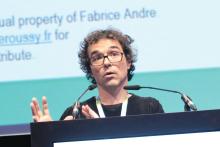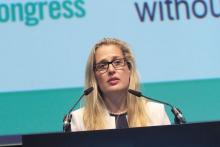MUNICH – A combination of the selective phosphoinositide 3-kinase inhibitor alpelisib and fulvestrant (Faslodex) was associated with significantly better progression-free survival than placebo plus fulvestrant in patients with hormone receptor–positive, HER2-negative breast cancer with PIK3CA mutations, investigators in the SOLAR-1 trial reported.
The addition of alpelisib, an inhibitor of the alpha isoform of the phosphoinositide 3-kinase (PI3K), to fulvestrant, a selective estrogen receptor modifier, was associated with a 35% improvement in progression-free survival (PFS), reported Fabrice André, MD, of Institut Gustave Roussy, Villejuif, France.
“Alpelisib plus fulvestrant is a potential new treatment option for patients with PIK3CA-mutant, hormone receptor–positive, HER2-negative advanced breast cancer who have progressed on prior endocrine therapy, with or without a CDK 4/6 [cyclin-dependent kinases 4/6] inhibitor,” he said in a podium presentation at the European Society for Medical Oncology Congress.
Unlike other PI3K inhibitors which have activity spanning the alpha, beta, gamma, and delta isoforms of PI3K, alpelisib is specific for only the alpha isoform, giving it a safety profile that compares favorably with other agents in its class, Dr. André said.
Results of other studies combining PI3K inhibition with endocrine therapy have not borne especially sweet fruit. For example, the SANDPIPER trial, a study of the combination of fulvestrant and the PI3K inhibitor idelalisib (Zydelig) presented at the 2018 annual meeting of the American Society of Clinical Oncology, showed a benefit of 2 months more PFS, compared with fulvestrant alone, but at the cost of serious toxicities in half of all patients treated with the combination.
In the SOLAR-1 trial, investigators randomized 572 postmenopausal women, or men (sex of patients not shown), with hormone receptor–positive, HER2-negative advanced breast cancer. Of the 572 patients, 341 were determined to have PIK3CA mutations.
To be eligible for the study, patients had to have good Eastern Cooperative Oncology Group performance status (1 or less) and have received one or more prior lines of endocrine therapy but no chemotherapy for advanced breast cancer.
Patients who had previously received fulvestrant, any PI3K inhibitor, Akt inhibitor, or mammalian target of rapamycin inhibitor were excluded.
The patients were randomly assigned to receive intramuscular fulvestrant 500 mg on days 1 and 15 of treatment cycle 1 and then every 28 days, plus either oral alpelisib (300 mg daily) or placebo.
Locally assessed PFS in patients with PIK3CA mutations, the primary endpoint, favored alpelisib. At a median follow-up of 20 months, the median PFS with alpelisib was 11 months, versus 5.7 months for placebo. The hazard ratio for progression with alpelisib was 0.65 (P = .00065).
A blinded independent review committee assessment of 50% of patients in the PIK3CA-mutant cohort supported the investigator-assessed findings, with a median PFS of 11.1 months with alpelisib, versus 3.7 months with placebo.
In contrast, a proof-of-concept analysis of the 231 patients without PIK3CA mutations could not show a benefit for alpelisib over placebo.
In the PIK3CA-mutant cohort, the overall response rates among patients with measurable disease were 35.7% with alpelisib versus 16.2% with placebo (P = .0002). Respective response rates among all patients were 26.6% and 12.8% (P = .0006).
Adverse events in the entire trial population included hyperglycemia leading to discontinuation of alpelisib in 6.3% of patients and rash leading to discontinuation of the drug in 3.2% of patients. There were no discontinuations for either hyperglycemia or rash in the placebo arm.
The hyperglycemia can be managed with metformin, Dr. André said.
At a briefing prior to presentation of the SOLAR-1 data in a symposium, briefing discussant Nadia Harbeck, MD, of the University of Munich Medical Center said that the trial represents a significant advance.
“We have numerous talks, also phase 3 trials, with PI3-kinase inhibitors where we saw marginal benefit, and the drugs weren’t usable in clinical practice because the tolerability was so bad. So this is now the first phase 3 data proving that if you have a targeted drug and the tumor has the target, you can actually almost double progression-free survival, and I think this will change the way we practice,” she said.
Rebecca Dent, MD, a senior consultant at the National Cancer Centre Singapore, the invited discussant at the symposium, complimented the SOLAR-1 investigators for conducting a “clinically homogeneous, biomarker-driven clinical trial reflecting new pathways to registration.”
She suggested that the significant clinical toxicities seen with PI3K inhibitors might be ameliorated with different dosing schedules, pharmacodynamic endpoints such as hyperglycemia, or potential prophylaxis.
The trial demonstrated a clinically meaningful absolute PFS benefit, the best in class, but updated data, including overall survival data, are still needed, Dr. Dent said. “We also need to see the quality-of-life data; this is what’s important for our patients. Is this improving progression-free survival, is it improving quality of life, and is it improving overall survival? Only the future will tell.”
SOLAR-1 was sponsored by Novartis. Dr. André disclosed research grants from Novartis and others. Dr. Dent disclosed advisory board, honoraria, or travel support from Novartis and others. Dr. Harbeck disclosed honoraria for consulting and lecturing for Pfizer and others.
SOURCE: Andre F et al. ESMO 2018, Abstract LBA3_PR.



